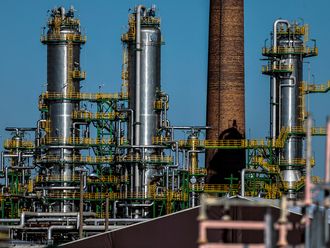Dubai: The Euro rose on Monday, recovering partly from the lowest level in more than 11 years on profit-taking, while stocks in Europe extended gains even as an anti-austerity party won the elections in Greece.
The euro climbed 0.6 per cent to $1.1273, after sliding to $1.1098, the weakest level since September 2003. The anti-austerity party Syriza won 149 seats in the 300-seat Greek parliament, setting Athens on a collision course with international lenders and potentially threatening its place in the euro.
“The result was more or less in line with expectation and considering we have seen a considerable amount of euro selling during the past couple of weeks it has been a day of consolidation,” Ole Hansen from Saxo Bank told Gulf News from Copenhagen.
The euro is likely to go lower but speculative short positions are very over extended which potentially calls for a bit of profit taking, potentially up to 1.1350, said Hansen.
Meanwhile, Morgan Stanley cut its estimate of where the euro will end 2015 to $1.05 from $1.12 previously. Bank of America Merrill Lynch sees the euro now falling to $1.10 by the end of the year, from $1.20 in an earlier forecast, while HSBC Holdings analysts cut their year-end expectation to $1.09 from $1.15.
Stocks up:
The Stoxx Europe 600 Index advanced 0.2 per cent after closing at a seven-year high on Friday. Deutsche Boerse AG Germany was 0.95 per cent higher at 10,751.20.
“Stocks in Europe are fixated on the imminent boost from increased liquidity and have taken the Greek result as a minor hiccup. Stocks in Europe will continue to perform but may soon be in need of some consolidation following a very strong rally this January,” said Hansen.
Elsewhere, US stock futures were little changed in early trade. Dow Jones Industrial Average was almost steady at 17,577, while S&P 500 futures was flat at 2,403.80.
Gold in the international spot market was down 0.78 per cent to be at $1,248.02 an ounce, while silver was also down 0.97 per cent at $18.12 an ounce.
Gold has gained about 9 per cent so far this month, largely due to safe-haven demand sparked by falling oil prices and European uncertainties.












